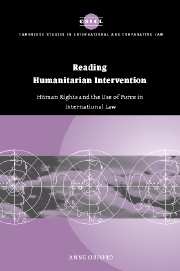Book contents
- Frontmatter
- Contents
- Preface
- 1 Watching East Timor
- 2 Misreading the texts of international law
- 3 Localizing the other: the imaginative geography of humanitarian intervention
- 4 Self-determination after intervention: the international community and post-conflict reconstruction
- 5 The constitution of the international community: colonial stereotypes and humanitarian narratives
- 6 Dreams of human rights
- Bibliography
- Index
- CAMBRIDGE STUDIES IN INTERNATIONAL AND COMPARATIVE LAW
4 - Self-determination after intervention: the international community and post-conflict reconstruction
Published online by Cambridge University Press: 05 July 2009
- Frontmatter
- Contents
- Preface
- 1 Watching East Timor
- 2 Misreading the texts of international law
- 3 Localizing the other: the imaginative geography of humanitarian intervention
- 4 Self-determination after intervention: the international community and post-conflict reconstruction
- 5 The constitution of the international community: colonial stereotypes and humanitarian narratives
- 6 Dreams of human rights
- Bibliography
- Index
- CAMBRIDGE STUDIES IN INTERNATIONAL AND COMPARATIVE LAW
Summary
This chapter is concerned with the representation of the role of the international community in the wake of humanitarian intervention. In the cases of Bosnia-Herzegovina and East Timor, the challenges to be addressed by the international community are seen to include the design of new constitutional, legal and administrative arrangements, nation-building, and economic management through the creation of a stable environment in which foreign aid and investment can take place. This chapter explores the way in which legal texts about the administration of territories by the international community attempt to manage and narrate the consequences of humanitarian intervention.
The first part of the chapter outlines the role of territorial administrator that international actors have adopted in Bosnia-Herzegovina and East Timor. It explores the ways in which international reconstruction constitutes the international community – both materially in terms of the economic liberalisation facilitated by reconstruction, and symbolically through the notions of charity, pedagogy and functionalism that underpin representations of the role of international administration. The second part explores the ways in which the project of post-conflict reconstruction mirrors the support by the international community for colonialism in earlier periods. From its authorisation of the acquisition of territory belonging to uncivilised peoples through to the operation of the mandate system, the international community has systematically facilitated the enterprise of colonialism. Central to this support has been the limited meaning given to the concept of self-determination.
- Type
- Chapter
- Information
- Reading Humanitarian InterventionHuman Rights and the Use of Force in International Law, pp. 126 - 157Publisher: Cambridge University PressPrint publication year: 2003



